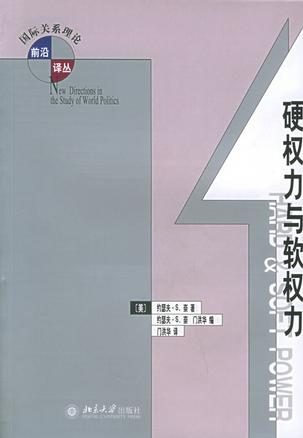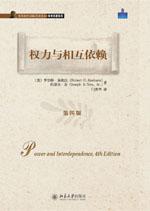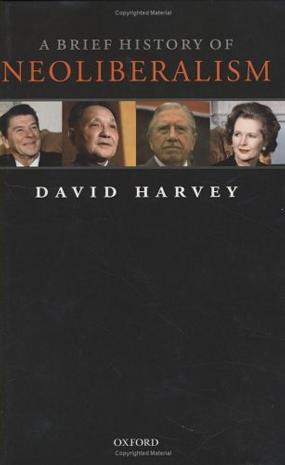-

硬权力与软权力
《硬权力与软权力》是知名国际关系学者约瑟夫.S.奈过去近20年撰写的主要论文的结集,是专为中国读者编辑的一本学术著作。《硬权力与软权力》收录了约瑟夫.奈1986-2003年撰写并公开发表的13篇论文,以及2004年专门为本文集撰写的《硬权力与软权力》一文。这些文章以权力变迁和美国国家利益为核心,以软权力与硬权力的关系为重点,围绕现实主义与自由主义、权力与相互依赖、全球化与全球治理等问题展开,构成了理解美国国际战略的一条主线。《硬权力与软权力》还收录了门洪华博士撰写的《国际机制与美国霸权》一文,作为中国学者对对约瑟夫.奈学术研究的回应。 -

权力与相互依赖
权力与相互依赖(第四版),ISBN:9787301198254,作者:(美)基欧汉,(美)奈 著,门洪华 译 -

A Brief History of Neoliberalism
Neoliberalism - the doctrine that market exchange is an ethic in itself, capable of acting as a guide for all human action - has become dominant in both thought and practice throughout much of the world since 1970 or so. Its spread has depended upon a reconstitution of state powers such that privatization, finance, and market processes are emphasized. State interventions in the economy are minimized, while the obligations of the state to provide for the welfare of its citizens are diminished. David Harvey, author of 'The New Imperialism' and 'The Condition of Postmodernity', here tells the political-economic story of where neoliberalization came from and how it proliferated on the world stage. While Thatcher and Reagan are often cited as primary authors of this neoliberal turn, Harvey shows how a complex of forces, from Chile to China and from New York City to Mexico City, have also played their part. In addition he explores the continuities and contrasts between neoliberalism of the Clinton sort and the recent turn towards neoconservative imperialism of George W. Bush. Finally, through critical engagement with this history, Harvey constructs a framework not only for analyzing the political and economic dangers that now surround us, but also for assessing the prospects for the more socially just alternatives being advocated by many oppositional movements. -

权力与相互依赖
这本里程碑式的著作最初由该领域两位最负盛名的学者写就,它为人们理解当代世界政治提供了丰富的理论途径。这本书构造了一种看待世界政治的途径,它能够帮助我们理解经济、政治以及制度化合作的模式之间的关系,同时也保留了现实主义对力量和利益的重要地位的认同。 1977年本书第1版的面世,标志着新自由主义国际关系学派挑战现实主义理论霸主地位的开始。自此以后,它一直是国际关系研究引用频率最高的著作之一。该书于1989年重版,由两位学者增加了对批评的回应。1992年我国曾出版过第1版的中译本。2001年第3版面世后,由青年学者门洪华翻译成中文本于2002年出版。在第3版中新增加了两个章节:第九章力量、相互依赖与信息时代对新技术的影响作了探究;第十章力量,相互依赖与全球主义则对全球化与当代世界政治的关系进行审视。 对21世纪的中国学者,公民和决策者而言,本书确实提供了第二副眼镜,透过这副眼镜我们可以更清晰,更 好地专注于认识复合相互依赖,相互依赖与权力相结合的更为宽泛的模式。 ——罗伯特·基欧汉《权力与相互依赖》中文版序言 -

Governing China's Population
China’s giant project in social engineering has drawn worldwide attention, both because of its coercive enforcement of strict birth limits, and because of the striking changes that have occurred in China’s population: one of the fastest fertility declines in modern history and a gender gap among infants that is the highest in the world. These changes have contributed to an imminent crisis of social security for a rapidly aging population, provoking concern in China and abroad. What political processes underlie these population shifts? What is the political significance of population policy for the PRC regime, the Chinese people, and China’s place in the world? The book documents the gradual “governmentalization” of China’s population after 1949, a remarkable buildup of capacity for governance by the regime, the professions, and individuals. Since the turn of the millennium the regime has initiated a drastic shift from “hard” Leninist methods of birth planning toward “soft” neoliberal approaches involving indirect regulation by the state and self-regulation by citizens themselves. Population policy, once a lagging sector in China’s transition from communism, is now helping lead the country toward more modern and internationally accepted forms of governance. Governing China’s Population tells the story of these shifts, from the perspectives of both regime and society, based on internal documents, long-term fieldwork, and interviews with a wide range of actors—policymakers and implementers, propagandists and critics, compliers and resisters. This study also illuminates the far-reaching consequences for China’s society and politics of deep state intrusion in individual reproduction. Like Mao’s Great Leap Forward, Deng’s one-child policy has created vast social suffering and human trauma. Yet power over population has also been positive and productive, promoting China’s global rise by creating new kinds of “quality” persons equipped to succeed in the world economy. Politically, the PRC’s population project has strengthened the regime and created a whole new field of biopolitics centering on the production and cultivation of life itself. Drawing on approaches from political science and anthropology that are rarely combined, this book develops a new kind of interdisciplinary inquiry that expands the domain of the political in provocative ways. The book provides fresh answers to broad questions about China’s Leninist transition, regime capacity, “science” and “democracy,” and the changing shape of Chinese modernity. -

A Brief History of Neoliberalism
Neoliberalism--the doctrine that market exchange is an ethic in itself, capable of acting as a guide for all human action--has become dominant in both thought and practice throughout much of the world since 1970 or so. Writing for a wide audience, David Harvey, author of The New Imperialism and The Condition of Postmodernity, here tells the political-economic story of where neoliberalization came from and how it proliferated on the world stage. Through critical engagement with this history, he constructs a framework, not only for analyzing the political and economic dangers that now surround us, but also for assessing the prospects for the more socially just alternatives being advocated by many oppositional movements.